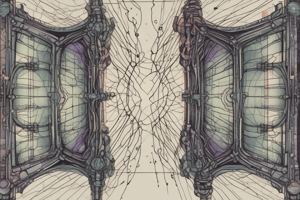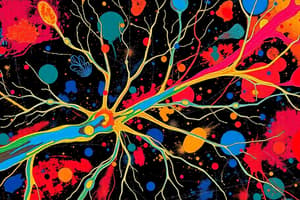Podcast
Questions and Answers
What dimension of pain deals with sensation and pain localization?
What dimension of pain deals with sensation and pain localization?
- Emotional distress
- Cognitive-evaluative
- Medial division
- Sensory discriminative (correct)
The medial pain system is purely sensory, while the lateral pain system is emotional.
The medial pain system is purely sensory, while the lateral pain system is emotional.
False (B)
Name one factor that influences between-individual differences in pain perception.
Name one factor that influences between-individual differences in pain perception.
Sex, ethnicity/cultural affiliation, or personality characteristics.
The emotional response and motivational aspects of pain are addressed in the __________ dimension.
The emotional response and motivational aspects of pain are addressed in the __________ dimension.
Match the following factors with their descriptions:
Match the following factors with their descriptions:
What is a perceived benefit of incapacity?
What is a perceived benefit of incapacity?
People experience automatic evaluation as a fast, volitional process.
People experience automatic evaluation as a fast, volitional process.
What do CO2 lasers trigger in the skin?
What do CO2 lasers trigger in the skin?
What is forward telescoping?
What is forward telescoping?
Damage to the cerebellum affects episodic memory.
Damage to the cerebellum affects episodic memory.
What brain area is primarily associated with classic amnesia?
What brain area is primarily associated with classic amnesia?
EEG measures the electrical activity of the brain, while _____ represents the brain's response to specific stimuli.
EEG measures the electrical activity of the brain, while _____ represents the brain's response to specific stimuli.
Match the brain areas with their respective roles in memory:
Match the brain areas with their respective roles in memory:
Which imaging technique is best for understanding memory localization?
Which imaging technique is best for understanding memory localization?
Explicit tests involve unconscious and unintentional recollection of information.
Explicit tests involve unconscious and unintentional recollection of information.
What indicates that memory is non-unitary?
What indicates that memory is non-unitary?
Which brain areas are more commonly activated in adults compared to children when processing non-congruent noun-colour pairs?
Which brain areas are more commonly activated in adults compared to children when processing non-congruent noun-colour pairs?
Prolonged early stress has a beneficial effect on the hippocampus.
Prolonged early stress has a beneficial effect on the hippocampus.
What is the reminiscence bump?
What is the reminiscence bump?
Flashbulb memories are often associated with ______, surprising, or emotionally arousing moments.
Flashbulb memories are often associated with ______, surprising, or emotionally arousing moments.
Match the type of memory with its characteristic:
Match the type of memory with its characteristic:
What effect does moderate stress have on early memory formation?
What effect does moderate stress have on early memory formation?
What term describes the increase in the number of memories during young adulthood and again in later years of life?
What term describes the increase in the number of memories during young adulthood and again in later years of life?
Events that are personally important, unique, and ______ are more likely to be remembered.
Events that are personally important, unique, and ______ are more likely to be remembered.
Declarative memory remains constant throughout childhood.
Declarative memory remains constant throughout childhood.
In old age, implicit memory shows a significant decline.
In old age, implicit memory shows a significant decline.
What cognitive components develop through childhood that affect episodic memory?
What cognitive components develop through childhood that affect episodic memory?
As children grow older, they are more likely to create __________ memories.
As children grow older, they are more likely to create __________ memories.
Match the following aspects of memory development with their characteristics:
Match the following aspects of memory development with their characteristics:
What is the role of conversations with adults in childhood memory?
What is the role of conversations with adults in childhood memory?
The medial temporal lobe is associated with the development of false memories in children.
The medial temporal lobe is associated with the development of false memories in children.
What typically happens to the details of episodic memories over time?
What typically happens to the details of episodic memories over time?
What is the primary function of the dorsal lateral prefrontal cortex?
What is the primary function of the dorsal lateral prefrontal cortex?
A decision made under uncertainty has more information available than a decision made under risk.
A decision made under uncertainty has more information available than a decision made under risk.
Define decision-making.
Define decision-making.
System 1 thinking is characterized as __________.
System 1 thinking is characterized as __________.
Which of the following best describes System 2 thinking?
Which of the following best describes System 2 thinking?
Heuristics are cognitive rules of thumb or mental __________.
Heuristics are cognitive rules of thumb or mental __________.
Match the following decision-making concepts to their descriptions:
Match the following decision-making concepts to their descriptions:
Irrationality refers to our ability to make decisions based solely on logic and reasoning.
Irrationality refers to our ability to make decisions based solely on logic and reasoning.
What is primarily affected in Alzheimer’s due to the build-up of amyloid plaques?
What is primarily affected in Alzheimer’s due to the build-up of amyloid plaques?
Treatments for Alzheimer’s aim to cure the disease.
Treatments for Alzheimer’s aim to cure the disease.
What is the primary function of acetylcholinesterase inhibitors in Alzheimer’s treatment?
What is the primary function of acetylcholinesterase inhibitors in Alzheimer’s treatment?
The main visual receptors in the retina responsible for light detection are called ______.
The main visual receptors in the retina responsible for light detection are called ______.
Which stage comes first in visual perceptual processing?
Which stage comes first in visual perceptual processing?
Match the terms with their definitions:
Match the terms with their definitions:
Visual perception solely relies on the information presented in the stimulus.
Visual perception solely relies on the information presented in the stimulus.
Name one drug used to inhibit acetylcholinesterase in Alzheimer’s treatment.
Name one drug used to inhibit acetylcholinesterase in Alzheimer’s treatment.
Flashcards
Sensory-discriminative pain
Sensory-discriminative pain
The sensory experience of pain, including its location, intensity, and type.
Affective-motivational pain
Affective-motivational pain
The emotional and motivational aspects of pain, including distress and unpleasantness.
Cognitive-evaluative pain
Cognitive-evaluative pain
The cognitive interpretation and appraisal of pain, including beliefs, expectations, and coping mechanisms.
Lateral vs. Medial Pain Systems
Lateral vs. Medial Pain Systems
Signup and view all the flashcards
Between-Individual Differences in Pain
Between-Individual Differences in Pain
Signup and view all the flashcards
Within-Individual Differences in Pain
Within-Individual Differences in Pain
Signup and view all the flashcards
Perceived Benefits of Incapacity
Perceived Benefits of Incapacity
Signup and view all the flashcards
Perceived Costs of Incapacity
Perceived Costs of Incapacity
Signup and view all the flashcards
Reminiscence Bump
Reminiscence Bump
Signup and view all the flashcards
Recency Effect
Recency Effect
Signup and view all the flashcards
Childhood Amnesia
Childhood Amnesia
Signup and view all the flashcards
Implicit Memory
Implicit Memory
Signup and view all the flashcards
Declarative Memory
Declarative Memory
Signup and view all the flashcards
Episodic Memory Development
Episodic Memory Development
Signup and view all the flashcards
Neurobiology of Childhood Memory
Neurobiology of Childhood Memory
Signup and view all the flashcards
Age-Related False Memories
Age-Related False Memories
Signup and view all the flashcards
Color-Naming Task: Age Differences
Color-Naming Task: Age Differences
Signup and view all the flashcards
Memory and Aging: Brain Changes
Memory and Aging: Brain Changes
Signup and view all the flashcards
Stress Impact on Memory Formation
Stress Impact on Memory Formation
Signup and view all the flashcards
Early Stress and Memory Impairment
Early Stress and Memory Impairment
Signup and view all the flashcards
The Reminiscence Bump
The Reminiscence Bump
Signup and view all the flashcards
Self-Defining Memories
Self-Defining Memories
Signup and view all the flashcards
Flashbulb Memories
Flashbulb Memories
Signup and view all the flashcards
Comparing Flashbulb and Autobiographical Memories
Comparing Flashbulb and Autobiographical Memories
Signup and view all the flashcards
Forward Telescoping
Forward Telescoping
Signup and view all the flashcards
Non-unitary Memory
Non-unitary Memory
Signup and view all the flashcards
Brain Lesions and Memory
Brain Lesions and Memory
Signup and view all the flashcards
EEG/ERP
EEG/ERP
Signup and view all the flashcards
fMRI
fMRI
Signup and view all the flashcards
Explicit Test
Explicit Test
Signup and view all the flashcards
Implicit Test
Implicit Test
Signup and view all the flashcards
Role of Temporal Lobes in Memory
Role of Temporal Lobes in Memory
Signup and view all the flashcards
Decision Making
Decision Making
Signup and view all the flashcards
Decisions made under risk
Decisions made under risk
Signup and view all the flashcards
Decisions made under uncertainty
Decisions made under uncertainty
Signup and view all the flashcards
Irrationality
Irrationality
Signup and view all the flashcards
System 1 (Intuitive Thinking)
System 1 (Intuitive Thinking)
Signup and view all the flashcards
System 2 (Logical Thinking)
System 2 (Logical Thinking)
Signup and view all the flashcards
Heuristics
Heuristics
Signup and view all the flashcards
Framing Heuristics
Framing Heuristics
Signup and view all the flashcards
Amyloid plaques
Amyloid plaques
Signup and view all the flashcards
Cholinergic Degeneration in Alzheimer's
Cholinergic Degeneration in Alzheimer's
Signup and view all the flashcards
Acetylcholinesterase Inhibitors in Alzheimer's
Acetylcholinesterase Inhibitors in Alzheimer's
Signup and view all the flashcards
Perception
Perception
Signup and view all the flashcards
Visual Illusions
Visual Illusions
Signup and view all the flashcards
Illusions, Reality, and Sensation
Illusions, Reality, and Sensation
Signup and view all the flashcards
Perception: Beyond Sensory Information
Perception: Beyond Sensory Information
Signup and view all the flashcards
Visual Perceptions
Visual Perceptions
Signup and view all the flashcards
Study Notes
General Information
- No specific text, file, or questions were provided. Therefore, no study notes can be generated. Please provide the necessary information.
Studying That Suits You
Use AI to generate personalized quizzes and flashcards to suit your learning preferences.




